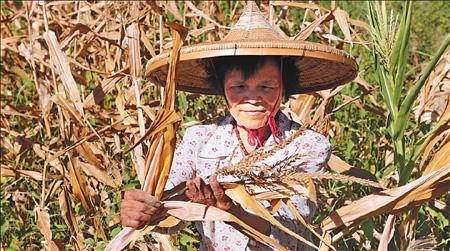
A woman in Wenquan village, Qionghai city of Hainan province, examines her scorched corn on Tuesday, a casualty of the heat wave that has been baking the province since the start of summer. [China Daily]
Frequent natural disasters this year may result in loss of '1 to 2 percent'
Beijing: An agricultural expert has warned of a "slight drop" in China's total grain output this year as a result of frequent natural disasters.
Lu Bu, a researcher from the Institute of Agriculture Resources and Regional Planning at the Chinese Academy of Agricultural Sciences, said 1 to 2 percent of grain loss is foreseeable, adding that fortunately, the decrease will be very minimal compared with the total grain yield of the country.
"Sure enough, excessive rain has severely damaged agricultural production in Guangdong, Guangxi, and Fujian, which were mainly supported by industrial crops, such as vegetables and sugarcane," Lu told China Daily.
"But for China's main crops, the damage is not great since the six provinces and autonomous region hit by rainstorms are not major grain producing regions," he said.
By June 20, a total of 1.3 million hectares of crops had been damaged by heavy rains in five provinces, including Zhejiang, Fujian, Jiangxi, Hunan, Guangdong and the Guangxi Zhuang autonomous region, according to statistics from the Ministry of Agriculture.
Of the total affected area of about 570,000 hectares of crops, some 60,600 hectares faced total crop failure.
According to the National Bureau of Statistics, the total grain yield of China's three main crops - rice, wheat and corn - was 470.27 million tons in 2008, only 17.29 percent of which came from the disaster-stricken areas.
Lu said that, in China, when the south is waterlogged, the whole country usually has a good harvest.
For instance, when the summer flood disaster hit as many as 29 provinces and cities in 1998, the total grain yield reached 512.3 million tons, a record that was not broken for the next nine years, according to statistics from the China Statistical Yearbook 2009.
Explaining the reason, Lu said: "The majority of the country's farms are situated on dry land and the heavy rain proved good for the crops."
China has already had a good harvest of summer grain crops this year, although Yunnan, Guizhou and Guangxi, which were hit by a prolonged drought, witnessed a significant agricultural loss, according to the Ministry of Agriculture.
It is estimated that the total yield for summer grain crops will reach over 123 million tons this year, almost the same as 2009.
"The current measures against natural disasters were efficient," Lu said. "For instance, in some plots of North China's Shanxi province, one of the drought-hit provinces, the wheat yield was over 7.5 tons per hectare, compared with the average of 3 tons by watering and increasing fertilizer dosages."
However, he added that the government should give more priority to the construction of infrastructure in rural areas and long-term programs to improve the local capacity to fight natural disasters by consolidating dams and improving irrigation facilities.





